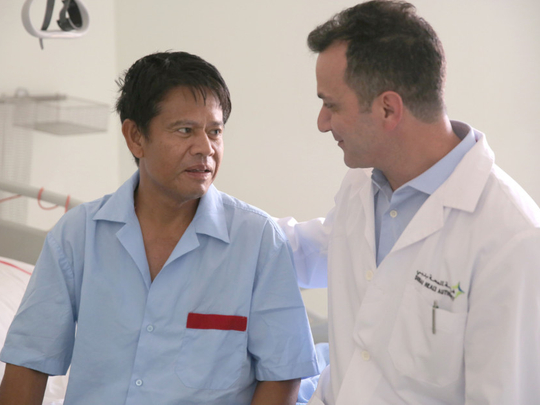
Dubai: Ship captain Renato Garcia could have died or been left completely paralysed after suffering a stroke while on board his vessel on June 16. But luckily it was not the end for the captain.
Thanks to doctors and medical staff at Rashid Hospital who gave him timely and effective care, Garcia beat the odds though more than 90 per cent of people in a similar condition don’t survive if they are not treated correctly.
“One minute I was fine and the next I felt dizzy,” Garcia recalled. “I then blacked out and, when I woke up, the paramedics were carrying me to the ambulance. I felt trapped in my body because my brain was functioning but I couldn’t move any part of my body including my face.”
Garcia was taken from Dubai Marina to Rashid Hospital, where he was diagnosed with basilar artery occlusion, an infrequent form of an acute stroke, which invariably leads to death or long-term disability if blood flow is not restored.
Dr Ayman Al Sibaie, interventional radiologist at Rashid Hospital said his department received an emergency call from the neurology department regarding Garcia’s critical case, and found that it requires immediate intervention.
An angiogram confirmed that Garcia has thrombosis [formation of blood clot that obstructs blood flow] in his basilar artery, which is responsible of carrying oxygenated blood to his brainstem, Dr Al Sibaie explained.
“The brainstem regulates vital functions, including the heart rate, eating, sleeping, and breathing, this means that any interruption of the blood flow through the basilar artery can lead to severe brain damage, organ malfunction, or even death. The more the delay in intervention, the greater the consequences,” he said.
Dr Al Sibaie said that two main procedures were required to treat Garcia, who was treated using a local anaesthetic. They first went in with a stent retrieval device that sucked the blood clot to restore the blood flow from the occluded blood vessels in the brain.
Dr Al Sibaie, however, found that Garcia’s basilar artery was narrowing and, if left untreated, another blood clot would block the artery again.
“To treat this issue, I introduced a balloon catheter to perform an angioplasty, which is a minimally invasive, endovascular procedure to widen the narrowed arteries. This was done by inserting the balloon catheter into the artery, then inflating it in order to dilate the narrowed region,” he said.
Dr Al Sibaie said that Garcia immediately started showing recovery signs — his ability to move restored — while he was on the surgery table.
He emphasised that the procedure conducted on the patient is a highly sophisticated and technically challenging procedure that was only introduced two years ago. He added that Rashid Hospital is currently the only hospital in the city to perform the technique.
“This procedure is rare and requires state-of-the-art technology and skilled doctors as the death prevalence of patients with this condition is 90 per cent. We conducted a clinical test and took a CT scan, which found that the procedure was a success,” he added.
From his hospital room, Garcia who can now walk, sit and talk as if nothing happened to him, said he feels as if he has been given a fresh chance at life.
“When I was paralysed, I felt dead. I now feel that my body is recharged, I would like to thank Rashid Hospital and its doctors for the care I have received.”












